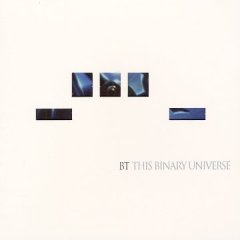
BT
This Binary Universe
(Binary Acoustics/DTS Entertainment; 2006)
By Jack Moss | 20 April 2010
Everything I ever have written and everything I will ever write on BT is probably an attempt to figure out exactly how someone who made so many awful records could once produce This Binary Universe. In fact, Dom had to cut my review of em>These Hopeful Machines (2010) in half to get rid of all the pseudo-psychoanalysis and preemptive apologising—and I’ll admit I probably care far too much, that sometimes it’s wise, no matter how obvious, to remember that I don’t know the guy, that I shouldn’t be drawing conclusions about him just because he can make two records of such wildly disparate nature and quality. That I should take what I can get.
Still, when I ask myself the all-important “Does he know what he’s doing?”, I’m not sure which answer I’d prefer: the affirmative, which admits all these terrible pop and rock cross-overs are just congealing into a mass of cynical exploitation of profitable paradigms; or the denial, which posits TBU as some sort of accident, a lucky combination of accessibility and aspiration from a guy who simply isn’t very good at producing mature, sophisticated, challenging music. Either way, we shouldn’t be concerned with these answers—this is postmodernism at its basest, where it doesn’t matter how something got to this point provided we can find something of worth in it. Take away the context, the guy’s chequered past, all the ugly connotations of the pop-trance scene he has gravitated towards, and This Binary Universe seems to exist in a galaxy all its own, self-contained and divorced from everything BT’s stood for before and after. Here is the definition of an Old Favorite: a record I’d really hate for you, dear cautious reader, to miss out on.
This Binary Universe, after all (to give you some context in the afterglow of the Glow’s 2000s list) was my album of the decade, and it might have been a few others’ as well had it not been utterly (and understandably) ignored by the entire blogosphere upon its release in 2006, not to mention by most fans of experimental electronic. By the mid-‘00s everyone had already written off BT, his early-career promise eclipsed by the awful trance-pop productions of the Emotional Technology (2003) era at a time when trance had utterly run out of shelf life. TBU was a sharp handbrake turn both in style and quality, one that even BT fans didn’t expect.
Those IDM-ites who did find their way to it queued up round the corner to take potshots at it, to point out the things that had been done before (the Eno, the Aphex, the Reich in there), to deny it any status as IDM at all, because heaven forbid fans of N*Sync producer and noted trance-man Brian Transeau would get their sticky little hands all over anything they might dare to love. And yes, this is an album full of avant-garde influences, of musique concrète, minimalism, math music, glitch, circuit-bending—BT pays tribute to it all. Which means it isn’t IDM as such, it’s also a jazz record, an ambient record, and a film score depending on where the needle’s dropped. This Binary Universe is a vast, sprawling thing full of sonic easter eggs, studio tricks, and audacious technological feats—Did you know the first track was composed entirely in programming code? Or that every element of “1.618” obeys that mathematical ratio?—with secrets, anecdotes, and inside jokes we probably still have yet to discover hidden in its folds.
And yet the real genius of what BT’s accomplished is that all these vast technological, mathematical, and musical conceits are pressed into servicing a far more obvious and intimate concept: This Binary Universe is a collection of seven lullabies for Transeau’s baby daughter. Clearly audible throughout, from the fairytale melodies to the deep serenity that pervades, that idea grounds the cerebral and the referential in something warm and heartfelt, taking the hard edge off the circuit boards.
Despite the simplicity of the controlling idea, this is still a big album in just about every sense, packed full of enough techniques, styles, influences, and musical spectacles to fill a decade of listening. But if there’s one absolutely vital moment to this record, it occurs at the end of “The Antikythera Mechanism,” the album’s epic, which shatters the relative calm of the preceding hour with the introduction of the 110-piece Seattle Symphony Orchestra for a dramatic theme that belies BT’s film score work. The thunder of the orchestra is certainly impressive, reminiscent of Stravinsky in its brutal destruction of a peace it otherwise spent so long in constructing, reprising towards an inevitable, cinematic finale and beginning to sound like a typical BT moment: admirable, though certainly overcooked and, especially, overstated. But the tidal wave never breaks; Transeau puts the entire orchestra through a glitch effect and detonates it into white noise, as if, for once, he recognises his own excess just in time to radically curb it. It’s not only a symbolic moment in terms of BT’s artistry, but also in terms of the album’s internal dynamic, demonstrating a fantastical world where something as vast and pompous as a symphony orchestra can be subordinated by something as small and simple as the click of a mouse—just as a man’s love for his daughter can, at least temporarily, triumph over the bigness and bombast of a universe on the verge of collapse. For me, in a decade beset with irony and cynicism, that was one victory deserving celebration.





